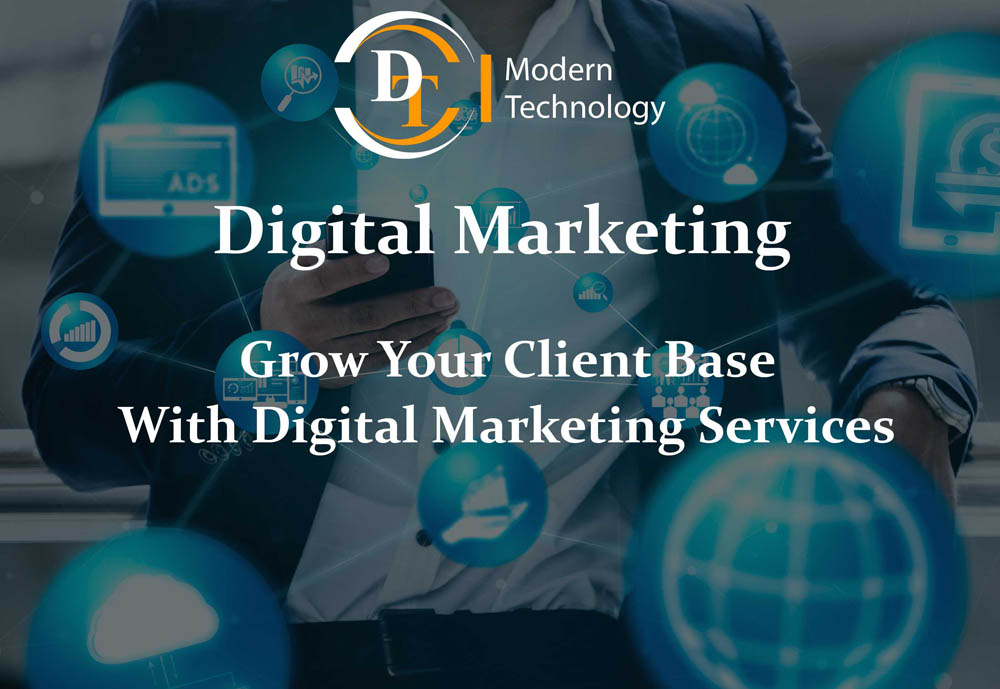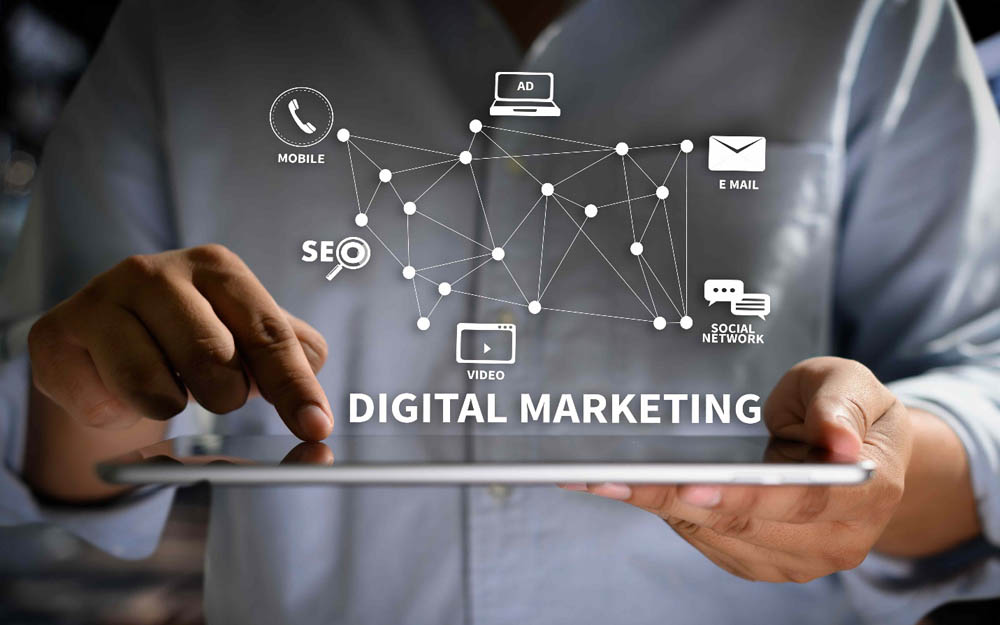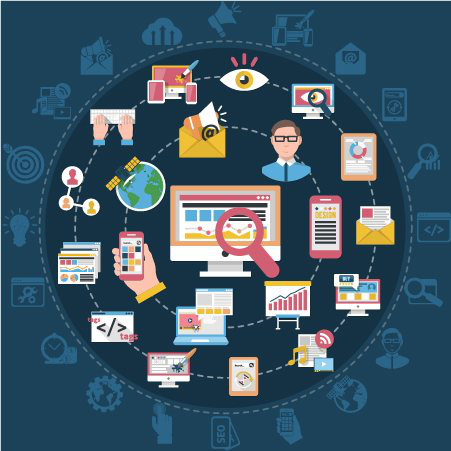Digital marketing

We can assume digital marketing’s definition as anything that comprises of electronic devices or internet. The purpose of digital marketing can be fulfilled electronically or online. So this means that great profit comes to the brands which includes Email, video social media or website based marketing opportunities. Business do require the Digital Marketing now a day at peak. One Can also do easily Digital Marketing Course online easily. Through Digital Marketing a business can work three times better than some normal strategies being used in market.
Every business or brand has a website or even if not then it must have social media ads and strategies. With digital marketing, you can also use tools like analytics dashboards to monitor the success and ROI of your campaigns more than you could with a traditional promotional content -- such as a billboard or print ad. In Digital Marketing, there are many digital tactics and channels which helps to connect with the customers online. There are many strategies which are all under the Digital marketing on which these relays.
A good Digital Marketer must have ability of seeing a clear picture of achieving the goals.
What are types of Digital Marketing?
- SEO (Search Engine Optimization) Your site or pages can be ranked organically by means of the SEO.
- Content Marketing It covers any digital marketing effort that comprises of content of any format.
- Social Media Marketing is the free, organic way to use social media platforms like Facebook or Twitter to market your business.
- PPC (Pay per Click) It covers digital marketing in the sense of users paying at every click on the ads.
- Affiliate marketing Another effort is of paying someone else so that he can promote your products or services on his site.
- Native Advertising these are the list of suggestions that could be present in the middle of the article.
- Email Marketing Most digital marketers use email marketing to advertise special deals, highlight content (often as part of content marketing) or promote an event.

What are Digital Marketing Strategies?
If we talk about the digital marketing strategies and assets, then it is most probably that people don’t know about these. Let us mention few of those as your website, Branded asset, Video Content, Images, Written Content, Reviews, Social media pages and Online products and tools. We will also define Digital Marketing Strategy as the plan being made to achieve specific goals through some Digital Marketing channels that could be paid, unpaid or earned media.
Digital Marketing Example
Taken into count, Pizza Hut can be taken an example of the Digital Marketing. A customer will easily download the app and interact with the seller Pizza Hut. There is already an app created which allows a person to create his own pizza to get. This was all done just by dragging the topping you need in the pizza based image. Then that will be finalized and you will get the nearest location of the Pizza Hut for your own ease and comfort.
What Are the Benefits of Digital Marketing?
Given the diversity of digital marketing methods, there is a sequentially diverse set of benefits present for digitally benefits. Digital marketing enables businesses to reach customers during everyday activities on an overarching level such as scanning social media, reading online articles, watching videos, etc. When customers are exposed to marketing in this type of natural and regular manner, it can give many a commercial benefits.
More specifically, digital marketing can help businesses to get any or all of the following benefits:
- Global Reach Opposite to traditional methods, digital marketing is not importantly bound to a specific geographic area. The internet is available to customers all over the globe. This allows businesses to market and sell to customers who live in a different state or country, removing many traditional barriers to entry.
- Low Cost of Entry For achieving the global reach of digital marketing by traditional channels, there would be a serious price tag attached. While on the other hand, certain aspects of digital marketing can be achieved with a small investment of time and resources. For example, even small or startup businesses can create a website, manage social media and publish blogs without breaking the bank.
- Measurable ROI For maximizing profits, businesses must carefully evaluate return on investment (ROI). With traditional marketing, ROI can be tough, sometimes not possible, to measure. On the other hand, digital marketing gives real-time visibility into the effectiveness of each campaign, enabling business leaders to make well-informed decisions to achieve revenue and increase profit.
- Improved Targeting Digital marketing give access to businesses to target very specific demographics of potential customers. By engaging customers in a particular geography, industry or social channel, businesses have a much better luck of reaching their target demographic.
- Dynamic Adaptability Digital marketing strategies are highly malleable and adjustable which enables businesses to adjust course when needed. Besides of long-term, traditional marketing campaigns, businesses are able to adjust their digital efforts on the fly, enabling quick pivots when necessary to realize commercial opportunity.
- Immediate Connection Before making a purchase, modern customers generally conduct online research and evaluate reviews. The first step in this process basically starts with a search engine. In this way, businesses with developed SEO, SEM and PPC strategies can connect quickly with customers.
- Relationship Building The rise of social media changed into a dominant communications platform for many customer demographics. Furthermore, customers increasingly want to get in touch with businesses on their terms and on their preferred platform. As a result, businesses that engage in effective SMM practices can build longtime and loyal relationships with current and prospective customers.
As a whole, businesses of every shape and size can get powerful advantages through effective use of digital marketing methods. Furthermore, the cost of digital marketing can be tailored to each specific business, stripping many hurdles to entry of traditional methods. Having so many benefits available for just about any budget, it makes sense why so many businesses are succeeding with digital marketing efforts.

The 5Ds of digital marketing
For understanding the value of digital to the future of marketing in any business, it’s good to think about what audience interactions we need to understand and manage. Marketing today is about many more types of audience interaction than website or email. Involving managing and harnessing these ‘5Ds of Digital’, this have defined in the introduction to the latest update to my Digital Marketing: Strategy, Planning and Implementation book.
The 5Ds define the opportunities for consumers to interact with brands and for businesses to reach and learn from their audiences in different ways:
- 1. Digital devices – audiences experience brands as they interact with business websites and mobile apps typically through a combination of connected devices including smartphones, tablets, desktop computers, TVs and gaming devices.
- 2. Digital platforms – most interactions on these devices are through a browser or apps from the major platforms or services, that’s Facebook (and Instagram), Google (and YouTube), Twitter and LinkedIn.
- 3. Digital media – different paid, owned and earned communications channels for reaching and engaging audiences including advertising, email and messaging, search engines and social networks.
- 4. Digital data – the insight businesses collect about their audience profiles and their interactions with businesses, which now needs to be protected by law in most countries.
- 5. Digital technology – the marketing technology or martech stack that businesses use to create interactive experiences from websites and mobile apps to in-store kiosks and email campaigns.
